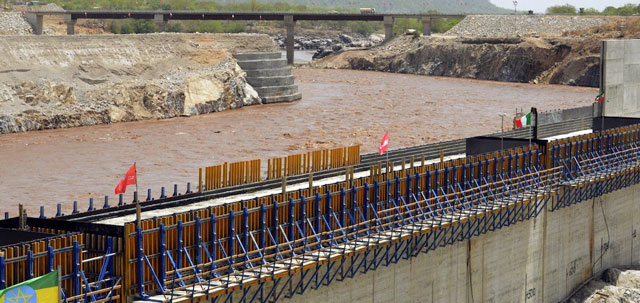
Pretoria, South Africa | Zachary Donnenfeld | ISS TODAY | The government of Ethiopia is currently constructing the Grand Ethiopian Renaissance Dam (GERD). Once complete, the GERD will be the largest hydropower facility in Africa (about 6 000 MW) – nearly triple the country’s current electricity generation capacity – and represent a potential economic windfall for the government.
The benefits for Ethiopia and for many electricity-importing countries in East Africa are clear. However the implications for downstream countries aren’t all positive – and need to be better understood.
In 2016, about 30% of Ethiopia’s population had access to electricity and more than 90% of households continued to rely on traditional fuels for cooking. Traditional fuels can cause respiratory infections, and according to the World Health Organisation, acute lower respiratory infection is the leading cause of death in Ethiopia.
With its national livelihood depending on the Nile, it’s difficult to anticipate what Egypt’s reaction might be should Ethiopia proceed with its plan to fill the dam. Egyptian Foreign Ministry spokesman Badr Abdelatty recently told Reuters that Egypt had ‘no other resources … we will not allow our national interests, our national security to be endangered’. This brings back memories of former president Mohamed Morsi’s ominous 2013 speech, in which he declared that if the Nile ‘loses one drop, our blood is the alternative’.
READ FULL ANALYSIS HERE (click)
Impact of Grand Ethiopian Renaissance Dam for downstream countries must be better understood. ISS Today https://t.co/3fplkM7Qcl pic.twitter.com/cqFHiV4cb9
— ISS (@issafrica) July 25, 2017
 The Independent Uganda: You get the Truth we Pay the Price
The Independent Uganda: You get the Truth we Pay the Price



Thanks for the attempting to discuss such an important project; but it is a bit disappointing to see that there was hardly any substance in what was written. I did not see any analysis on the benefits and the negative impacts on downstream countries – despite what was implied in the title. For example, the dam has the benefits of flood control, reducing evaporation losses & regulating the flow of water through out the year, all very positive for downstream countries; but you seem to focus on just one issue. For the credibility of your news, I hope next time you will write something that is based on facts and is supported by scientific data & analysis. Thank you.
This is a kind of biased, politically motivated and distorted analysis report. It could have been positive report, had it been evaluated and addressed the merits and demerits of the Damn to the upstream and downstream countries at equilibrium. Rather it is written in favor of the vocal country Egypt which usually cries for nothing.
It is sad and disappointing to see this kind of biased article on African Ugandan news paper. It is a copy paste article from Egypt online
Of course this is one of the envisaged strategy of Egyptians, handling every associated people with bribing or … so as such biased views propagated. I do not think this is view of an average thinking African Journalist.